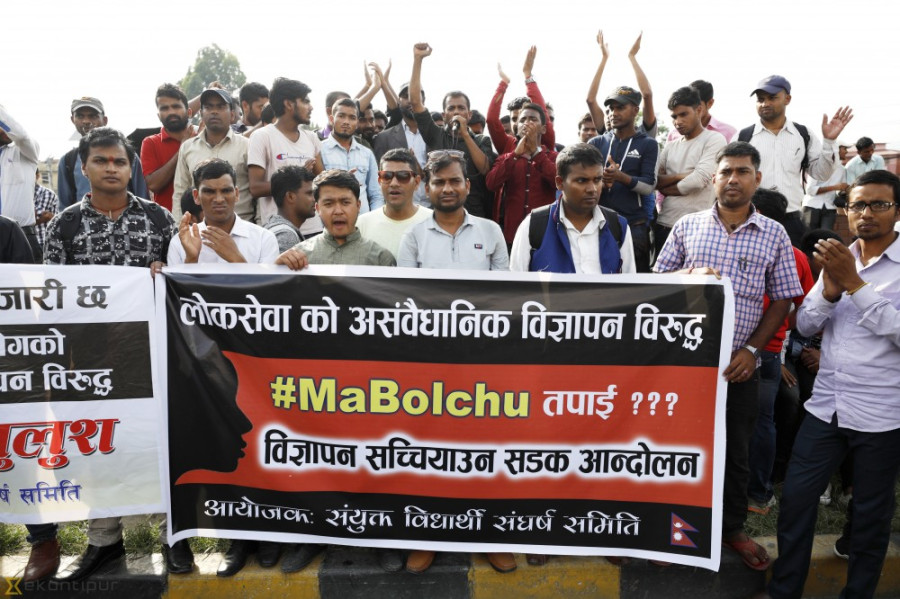Politics
Local units suffer as federal and provincial governments spar over staff hiring
Municipality and rural municipality representatives say lack of employees has affected service delivery
Prithvi Man Shrestha
Purna Chandra Bhattarai, a former government secretary, was in Ajirkot Rural Municipality, northwest of Gorkha district, last week as part of a programme to support the planning process of the rural municipality.
“There are five wards in the rural municipality but only one had a ward secretary ,” he told the Post. Before travelling to Ajirkot, he had visited Chum Nubri Rural Municipality, which borders China, where only two of the seven wards had secretaries.
The ward offices are responsible for various services to be provided by the rural municipalities such as implementing and monitoring development activities, certifying family relationship, making recommendations for citizenship certificates, certifying birth dates, issuing marriage certificates, certifying personal details and making necessary recommendations regarding land ownership, among others.
“Without ward secretaries, service delivery in the wards has been badly affected,” Bhattarai told the Post over the phone.
According to the National Association of Rural Municipalities in Nepal, an umbrella body of the rural municipalities, as many as 1,844 wards out of 3,201 wards of rural municipalities are without secretaries.
“This has forced elected representatives to perform the task of ward secretaries,” said Hom Narayan Shrestha, chairman of the association. “How long will it be possible for elected representatives to play the role of ward secretaries?”
According to him, apart from the lack of ward secretaries, the rural municipalities are also facing acute shortage of local education officers whose presence is important to meet the constitutional mandate that local governments should deal with basic and secondary education.
“Around 80-90 percent seats of local education officers are vacant,” said Shrestha.
The problem is mostly faced by new municipalities, as old municipalities are in a relatively better position when it comes to staff.
According to Ashok Kumar Byanju Shrestha, president of Municipal Association of Nepal, a grouping of municipalities across the country, around 60 percent wards of municipalities across the country are without secretaries. “There are not adequate staff related to health, education and agriculture.”
Since the federal government has failed to ensure that civil servants reach the rural municipalities after the staff adjustment, local governments are facing an acute shortage of staff.
Most of the civil servants chose the federal government and provincial governments to serve during the staff adjustment process, which left most of the local governments without adequate staff.
Amid a shortage of staff at the local level, the Public Service Commission announced vacancies to recruit 9,161 employees at 515 local units on May 29 at the request of the federal government.
But it landed in controversy because it failed to ensure 45 percent reservation for the marginalised communities, including indigenous nationalities, Madhesi, women, Dalit and backward and disabled people.
Provincial governments also protested against the vacancy announcement as Provincial Public Service Commission is supposed to recruit staff for the local governments as per the constitution.
The vacancies were announced at a time when the provincial governments had either registered the bill at the provincial assembly or the bills had been passed.
But the rural municipalities don’t want to enter into any dispute between the federal and provincial governments over the jurisdictions.
“As local governments don’t have to recruit permanent staff, we don’t want to enter into the jurisdictional dispute between them. We just want permanent and capable staff for us,” said Shrestha.
The local governments find the government’s failure to ensure more civil servants to the local level during the staff adjustment process as the main reason why local governments are facing acute staff shortages.
Amid staff shortage, the federal government had asked the local government to provide details about the shortage of staff at the local level.
“Forming Provincial Public Service Commission first and starting recruitment drive would have been the constitutional and non-controversial method,” said Byanju. “For this, provincial governments should be encouraged to form their own commission at the earliest.”
With the vacancy announcement of the Public Service Commission in controversy, there is no certainty when the local governments will get the required staff.
“If the federal government cannot give us staff, we have to recruit employees on a temporary basis. Federal or provincial governments should give us a standard for this to ensure that capable staff are recruited,” said Shrestha of Rural Municipality Association.
But administrative experts say it would be a dangerous move because it would prevent local governments from having competitive civil service.
“It will add long-term liabilities to local governments because once staff are recruited on a temporary basis, they will seek permanent positions later, just like it has happened in the past,” said Bhattarai, the former secretary. “If we want to exercise meritocracy in staff recruitment, we should not go for temporary staff hiring on a contract basis.”




 17.12°C Kathmandu
17.12°C Kathmandu















